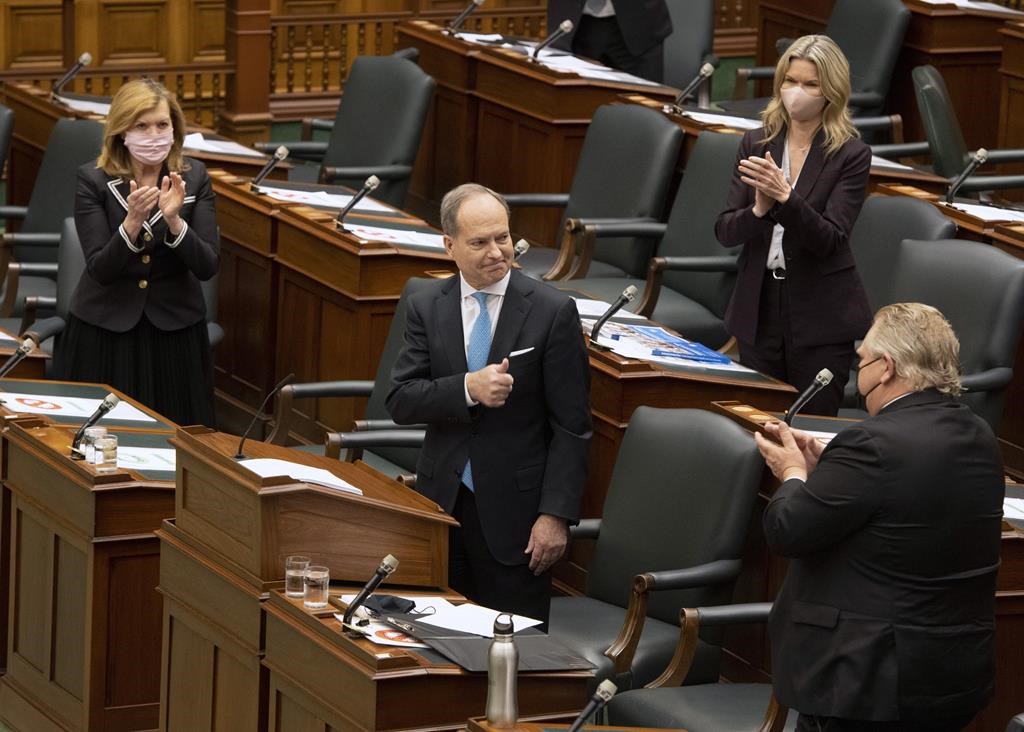
TORONTO, Kan. — Critics of Ontario’s $186-billion spending plan say it fails to meet the immediate needs of residents and small businesses struggling through the pandemic.
Posted Mar 25, 2021, 05:24AM EDT
TORONTO, Kan. — Critics of Ontario’s $186-billion spending plan say it fails to meet the immediate needs of residents and small businesses struggling through the pandemic.
The budget tabled by the Progressive Conservative government includes $6.7 billion in pandemic spending, including $1 billion for the provincial vaccination effort and $2.3 billion for contact tracing and testing.
The government will offer a second round of grants to small businesses to help with pandemic expenses, create a new job training tax credit and provide more benefits to families with children.
But opposition critics, unions and other stakeholders say supports for people are too slow, insufficient or nonexistent.
NDP Leader Andrea Horwath highlighted the lack of funds for hiring more teachers, slow relief for long-term care and the absence of a paid sick day policy to protect workers during the worsening third wave of COVID-19 infections.
Catherine Fife, the NDP’s finance critic, says business grants didn’t expand to more sectors and left out a large number of small businesses that employ many Ontarians.
“If there was ever a budget in the history of this province to invest in people, in businesses, this was the one, and this government missed the mark,” Fife said Wednesday.
The Canadian Union of Public Employees said the budget is a missed opportunity that makes more promises to help businesses than struggling workers.
“This budget is just classic trickle-down economics and it’s the last thing communities need,” CUPE Ontario President Fred Hahn said, also pointing to the lack of paid sick days.
Liberal Leader Steven Del Duca said the budget doesn’t offer adequate support for women, young people and racialized Ontarians who have lost work during the pandemic.
Unions representing education workers criticized the budget for not spending on adequate in-school safety measures, noting health impacts on workers during the pandemic including hospitalizations from the virus. They said the government is “shortchanging” students and families.
“Obviously, education is not a priority for this government,” their joint statement said.
Advocacy group People for Education said the budget made no mention of the critical need to address the effect of the pandemic on schools, students and staff. Instead, the government is sending “small cheques” to parents through its Ontario COVID-19 Child Benefit, it said.
“It would be more efficient (and) effective to spend that amount collectively on resources and programs in schools to address long-term impacts of COVID,” Annie Kidder, the group’s executive director, said on social media.
Others criticized the lack of environmental considerations in the economic recovery plan. Keith Brooks, programs director of Environmental Defence, said his organization was disappointed the budget didn’t include plans for a green recovery that centres on climate change.
“We were hopeful that the Ontario government would take this opportunity to revisit and reset its hostile approach to the environment. Sadly, that’s not the case,” Brooks said in a statement.
Business, health-care and industry groups, meanwhile, welcomed relief laid out for their sectors.
Anthony Dale, CEO of the Ontario Hospital Association, said the group appreciates new funding as hospitals work to “maintain stability during this ongoing crisis.”
Ontario Long Term Care Association CEO Donna Duncan said long-term care spending around staffing and expansion of available beds “will make a meaningful difference in the lives of Ontario’s seniors now and in the future.”
The Ontario Chamber of Commerce also welcomed supports for businesses and funding specifically geared toward the tourism sector, jobs training and broadband internet.
This report by The Canadian Press was first published March 25, 2021.
Holly McKenzie-Sutter, The Canadian Press





